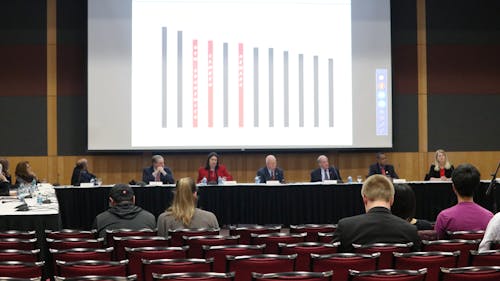Only 4 Rutgers students attend open tuition hearing

Every year, the Rutgers University Board of Governors holds an open session for students to voice their concerns regarding tuition, fees and housing charges. Members of the Rutgers community have historically turned out in large numbers, using the event as a platform to protest tuition hikes or communicate to administrators, but this year only four students sat in the audience.
The annual hearing represents one of only two formal opportunities for students to provide their input to the budget prior to its finalization. The second takes place in July each year after the plan has already been drafted.
Students and administrators alike noted the low turnout of the event this year, and the hearing wrapped up in an unprecedented 52 minutes.
To kick off the meeting, Vice President of Financial Planning and Budgeting Kathy Dettloff ran through the allotment of the University’s $3.9 billion expenses. Currently, she said 50 percent of the University’s spending goes towards paying the salaries and wages of professors and faculty. The other 15 percent is divided between utilities, services, fringe benefits, debt services and materials.
Dettloff also noted the declining support of the state and federal governments towards higher education institutions like Rutgers but said the school has managed to still minimize its tuition increases.
“Over the last five years, Rutgers has increased its rates an average of 2.4 to 2.5 percent annually but last year the increase was only 1.7 percent. This increase puts us in the middle of other New Jersey institutions,” Dettloff said.
This year’s tuition hike has not yet been announced.
“There were fewer (attendees) than I expected,” said University President Robert L. Barchi. “And I think there were two reasons for that. One is that if you look back over the years that I’ve been doing this, probably half or more of the students that spoke belonged to a common group of individuals who demonstrate around campuses for a variety of causes — and they were not here tonight for whatever reason … I think the other piece of it is that students realize we are working very hard to keep tuition down and relative to other places, we’re actually doing it. ”
This year’s budget hearing took place at the exact same time as the Take Back the Night March, which drew a crowd of more than 300 protesters to march from College Hall to the Voorhees Mall.
David Hughes, the president of the American Association of University Professors-American Federation of Teachers (AAUP-AFT), said the overlap between the two events was primarily responsible for the low turnout at the Board of Governors hearing. In 2011, he said 22 students stood up to speak at the hearing and the board subsequently lowered their tuition hike from 5 percent to 2.5 percent.
In 2016, The Daily Targum reported on a protest that took place at the Board of Governors open hearing. Students made signs and stood in solidarity with the speakers and nearly every seat in the room was full. Students also organized protests in both 2015 and 2013.
In regard to this year’s hearing, Barchi said he believed it was productive in bringing together a representative cross-section of the problems.
“I thought the comments from the students were well made and the positions well stated. I have to say I am very sympathetic to the issues that are raised here,” Barchi said. “I have major concerns about the financing of higher education in this country, I have major concerns about the state and federal government pulling back from their responsibility. I happen to think that public education is a public good and not a private endearment and I don't think that the cost should be shifted to the students.”
Despite this, Barchi noted that external pressures make it difficult for the administration to keep the tuition steady, let alone decrease them.
“Unfortunately we are in a situation where we have no other revenue sources. And if the state continues to ratchet down its support we try to be more and more efficient, we try to squeeze dollars out of operations but there's a limit to how much you can get out of that, so I don't want to raise tuition at all and I certainly want to make sure that we keep Rutgers affordable for the students least able to afford it,” Barchi said. “I think we’ve been able to do that.”
Kira Herzog is a School of Arts and Sciences sophomore majoring in political science and journalism and media studies. She is the news editor for The Daily Targum. Follow her on Twitter @kiraherzog1 for more.



